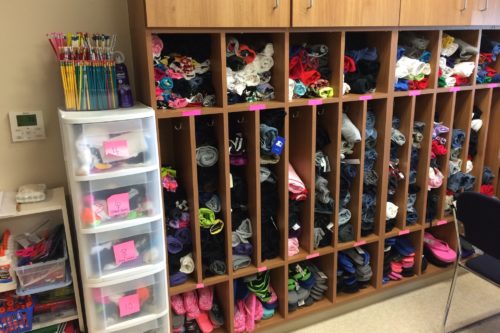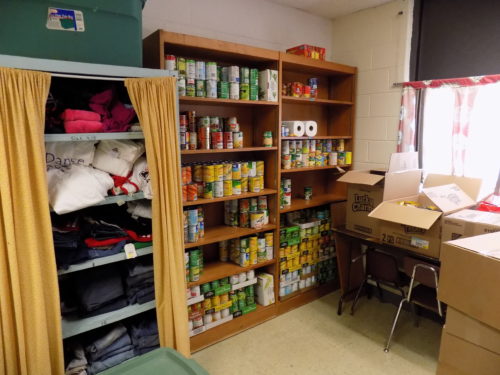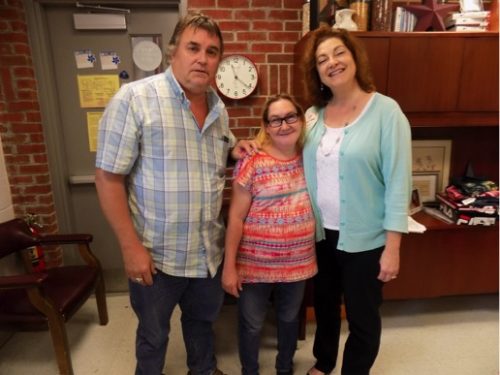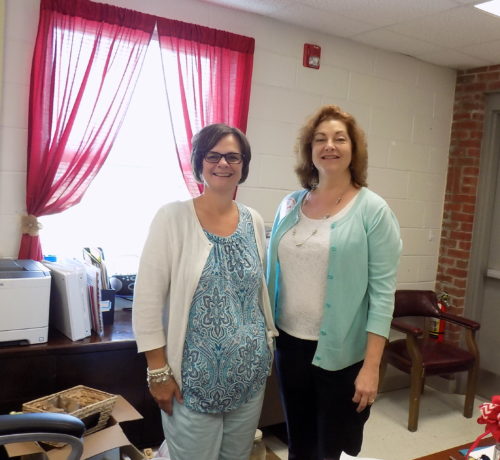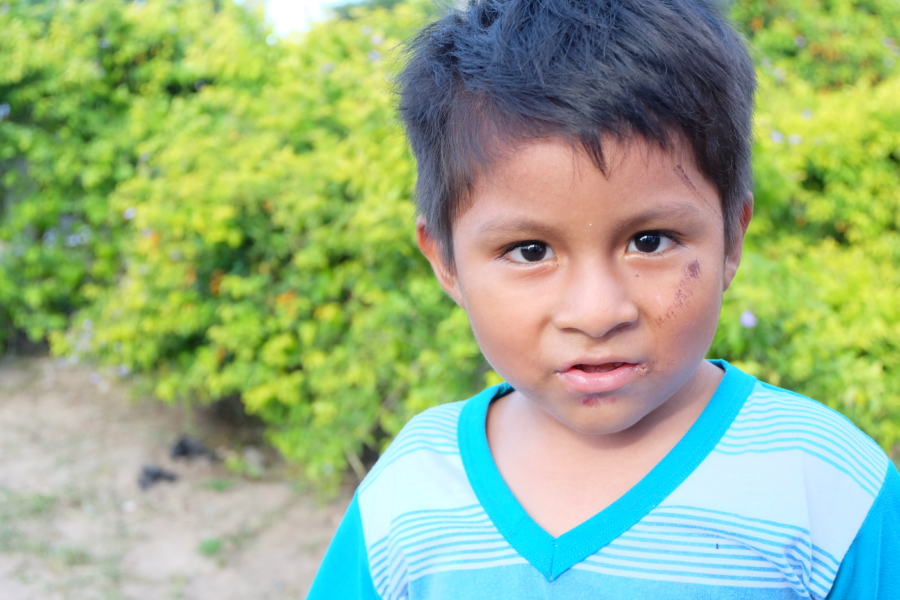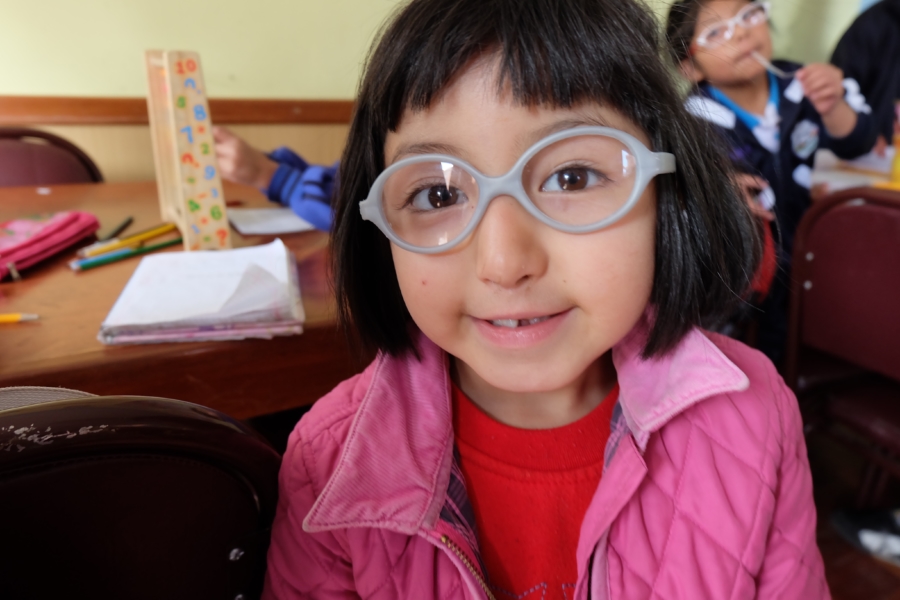Located in the town of Owingsville in Kentucky’s Bath County, Crossroads Elementary School is a consolidation of two of Children Incorporated’s former affiliated schools – Bethel and Salt Lick Elementary Schools. When the two older schools were shut down, one new school was built to replace them; and according to our Director of U.S. Programs, Renée Kube, who recently visited Bath County, the school is huge.
Serving 496 children in pre-kindergarten through fifth grade, a large percentage of students there is living in poverty. Seventy-five percent of the kids qualify for free meals. Many parents and guardians are small farmers, laborers, and service workers – they hold low-income jobs with little security. Many children are being raised by their grandparents, which is hard on their caretakers, especially the ones who have lived in poverty their whole lives.
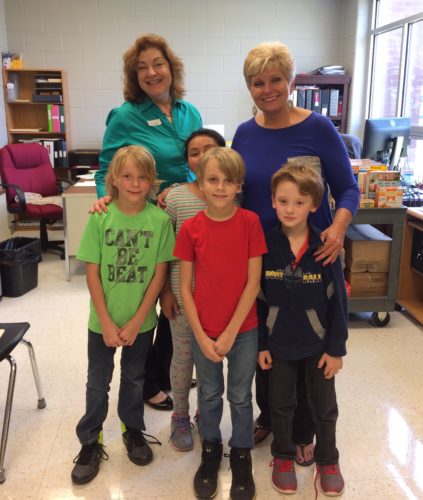
Renée, Gloria, and a few of our sponsored kids at Crossroads Elementary School pose for a photo.
Upon arriving at Crossroads Elementary School, Renée was greeted by our Volunteer Coordinator, Gloria, whose plan was to have Renée visit the Resource Center, and then meet some of our sponsored kids before taking a tour of the school. Built just eight years ago, the school has a modern feel that was apparent from the second Renée stepped through its front doors.
Renée could see large classrooms on either side of the hallways as she and Gloria made their way to the Resource Center, the corridors bright and sparkling, as though they had just been cleaned. Even before seeing it in its entirety, Renée thought it was a beautiful school, and it made her happy to imagine how hundreds of children in attendance had a large, safe, clean environment in which to learn and grow. Over the years, Renée has visited many of our sponsored children’s homes, which are typically old, small, rundown, and unkempt – a reflection of the extreme poverty in which these families live.
Resources for everyone
When they arrived at the Resource Center, Gloria showed Renée some cabinets and plastic storage bins that were stuffed with food and gently-used clothes. She explained that any child or family can come chose what they need; and for some children, she sends food home with them on the weekends if she’s worried they won’t have anything to eat otherwise.
Shortly after Gloria finished showing Renée her supplies, Natalie*, one of our sponsored children, arrived at the Resource Center. Natalie is a sweet and shy second-grader who loves to read. She and her brother are being raised by their disabled grandparents in a small, old mobile home. Natalie benefits greatly from the support of her sponsor, who ensures through her contributions that she gets appropriately-sized clothes and shoes, and school supplies and hygiene items all year long, as she needs them.
Next, Renée met Kevin*, another sponsored child who Gloria knew really needed the additional help that sponsorship provides. Gloria enrolled Kevin in our sponsorship program last December, but sometimes it takes a while to find sponsors for kids; by spring of the following year, Kevin was still waiting to be sponsored. During that time, he went to school in shoes that were completely split open and covered in duct tape. When Gloria brought him to the Resource Center to ask him about the shoes, Kevin said, “My shoes broke and Mama fixed them because I can’t have new ones.”
Many children are being raised by their grandparents, which is hard on their caretakers, especially the ones who have lived in poverty their whole lives.
Gloria knows Kevin’s mother struggles intensely – she is raising three kids in a small mobile home, and her sole income comes from work at a fast food restaurant where she makes minimum wage. Gloria was able to go to her cabinet and find Kevin a pair of gently-used shoes that, although not brand new, were at least not held together with tape. Thankfully, Kevin got a sponsor shortly after the incident, and now he receives new shoes and clothes that fit him perfectly.
A beautiful school
After visiting with Natalie and Kevin, Gloria took Renée on a tour of the school, which is colorful and full of natural light all throughout it. The computer lab has the latest technology, and the library is full of thousands of books, with brightly painted murals on the walls, and fun carpets laid across the floors. Renée loved seeing all the different rooms in the school – she felt as though it offers a wonderfully warm atmosphere for learning, and that it really does serve as an oasis for our sponsored kids, who come from broken homes and instability.
Once they arrived at the gymnasium, Renée found a big group of kids watching performers do exercise routines for the children to learn and then copy. Something special set up by the principal to reward the students for good attendance, they snapped, stomped, shook, and jumped in place on the floor of the big gym, with its shiny floors and new mats and bleachers. Renée could tell the children were having a fabulous time, and she once again found herself feeling thankful that these children, who had enough to worry about at home, living in poverty, have a lovely school to enjoy.
*Names changed for children’s protection.
***
HOW DO I SPONSOR A CHILD IN KENTUCKY?
You can sponsor a child in Kentucky in one of two ways: call our office at 1-800-538-5381 and speak with one of our staff members, or email us at sponsorship@children-inc.org.

